
The online world of Thierry Baudet and Forum voor Democratie
Digital media have an incredible impact on the lives of everyday people, but if you’re already famous, the spotlight tends to shine a little brighter. In this paper, I will be focusing on the online world of Forum voor Democratie, a right wing Dutch political party, and Thierry Baudet, their frontman. Through an exploration of their use of social media, analyses of their posts, and the way Baudet asserts himself as someone who is pro-freedom and equality, while simultaneously portraying aspects of nationalism through the use of sarcasm, I’ll be analyzing the virtual worlds in which both Baudet and Forum voor Democratie use various social media platforms to connect with their audience.
An Introduction to Forum Voor Democratie
A public right wing political Facebook account that has 129k followers is sure to gain attention online and Forum voor Democratie (FVD) has a timeline that isn’t shy of controversy. The posts are purely political and admins of the page are incredibly interactive with their audience, using various media to communicate with their following, such as videos, interviews, and images of members of parliament. This is clearly expressed in the way topics are addressed in posts, as well as in the captions that accompany them, which often place emphasis on the influx of immigrants, addressing other politicians through articles linked from the FVD website and encouraging users to vote, support, and join the FVD team.
The party is incredibly vocal about what they stand for. FVD is against Islamic culture integrating with Dutch society, for example, in fear of it threatening Dutch identity. Their nationalistic points of view also oppose the European Union (EU), campaign for a referendum on Dutch citizenship and like most political parties, they also practice mudslinging against other politicians whose views they may disagree with. as can be seen in Figure 1 of their Facebook page. This is a way for FVD to advance their own political party’s progress, as they share their views on the establishment, or ‘partijkartel’, by utilizing mudslinging to make themselves more appealing to their audiences.
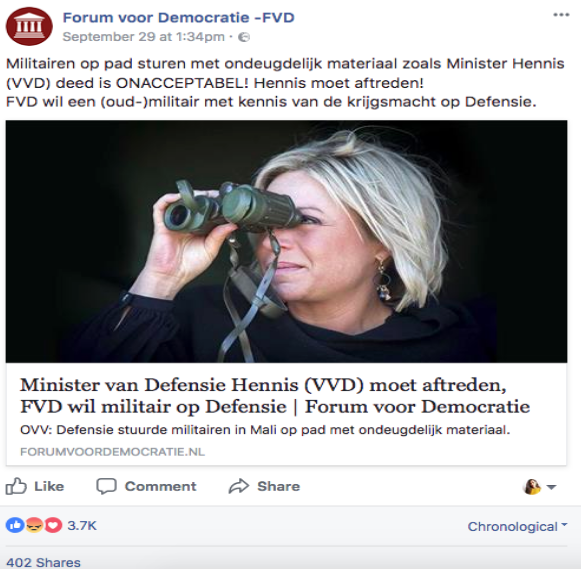
Forum Voor Democratie's timeline isn’t shy of controversy
The post featured above addresses an opposing party, Volkspartij voor Vrijheid en Democratie (VVD), a conservative and liberal political party, by stating that the then minister of defense Jeanine Hennis-Plasschaert, should step down from her position. The post received a lot of attention online, with 3.7k reactions, 923 comments and 402 shares. The types of reactions show that not all users who responded are in favour of this opinion, as can be seen by the angry reaction button in the middle. This shows that although FVD is supported by many, not all of their ideas are supported, and although the party is active, their ratio of followers to public interaction isn’t as engaging as one would expect. One reason for this is algorithmic populism, (Maly, 2018) as social media rely on engagement, with the voice of the audience in relation to the algorithms.
Videos To Share A Message
Videos are another popular communication tool used by the party. They frequently share videos in which Baudet is directly addressing the FVD’s Facebook followers and these are the ones that often get the most reactions. This can be explained by the nature of these videos. It feels more personal when someone is talking to you - even though it may be through a screen - about their goals and what they wish for the future of the Netherlands. However, a more important factor is the algorithmic bias (Maly, 2018) of these social media.
The algorithms of Facebook and other social media platforms such as Twitter, Instagram and Snapchat all promote the use of videos as a medium to attract attention and convey information. By packaging the voice of Baudet and his Forum voor Democratie in a video message, they use the algorithms to spread their voice. The party also recently shared a celebratory video about their one year anniversary, pictured in Figure 2, as FVD has officially been active for a whole year. The video addresses the audience personally and thanks them, informing them about politics in the Netherlands by stating facts such as “There are 17 million people in the Netherlands, but only 2% of the population is involved in politics.” This is a subtle way of promoting the party, as a link to become a member of FVD is attached in the caption underneath the video.
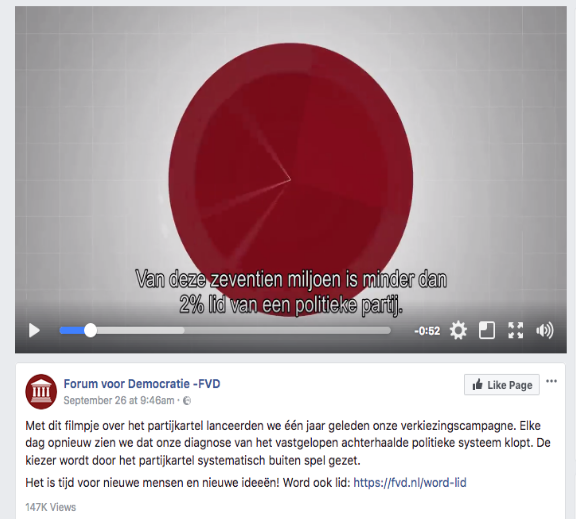
Other interesting videos include one in which Baudet is insulting Ahmed Marcouch, a Dutch politician with Moroccan roots, who is part of the political party Partij van de Arbeid (PvdA). The video is labelled ‘Marouch weet niks van Arnhem’, translating to ‘Marcouch knows nothing about Arnhem’, Arnhem being a city in the Netherlands. The video is an example of intertextuality with ‘geenstijl’ as Marcouch is interviewed about the history of Arnhem and the interview consists of questions he can’t always answer. According to a short clip of Baudet at the end of the video, Marouch is unfit to be labelled a Dutch politician. This rude statement quickly allowed for a heated discussion in the comment section as some people felt this video was meant jokingly and agreed with Baudet, while PvdA supporters weighed in on the controversial post and shared their opinions, claiming that the real reason that Baudet has created this video is to discriminate Marcouch on grounds of his Moroccan roots and that it has nothing to do with Marcouch not always being able to answer the questions about Arnhem’s history.
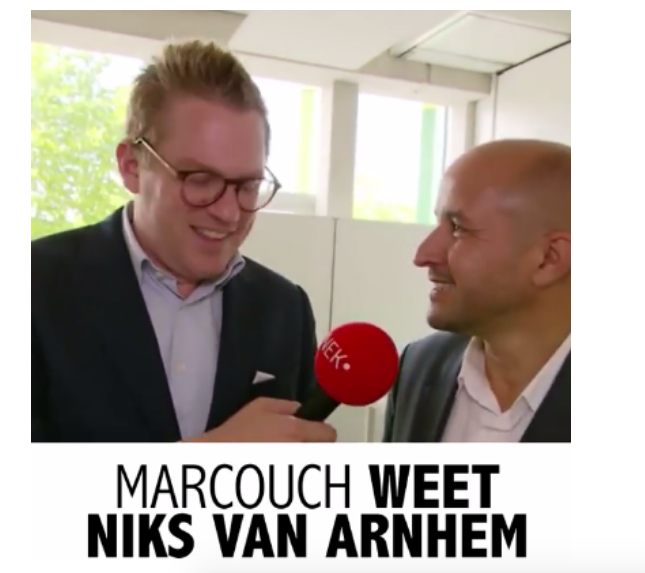
Social media rely on engagement, with the voice of the audience in relation to the algorithms
Exploring The Online World of Thierry Baudet
Thierry Baudet’s voice and his representation of all that FVD stands for clearly appeals to many, as can be seen on his social media platforms. With 74.3k followers on Twitter and 16.6k followers on Instagram, Baudet’s voice is heard throughout the Netherlands. Twitter, the main medium used for Baudet’s communication, is not only used for sharingpersonal information, but also regularly features posts of him retweeting from the political party’s account as a means of promotion. Baudet’s larger platform on Twitter, as opposed to Instagram, could be an indication that his content is taken more seriously there (possibly because politicians are more likely to use Twitter). The main difference between the two social media platforms is that Baudet’s personal life is kept more in the shadows on Twitter; often only discussing general politics, sharing updates on Forum Voor Democratie and sharing information regarding the Netherlands and the European Union (EU).
Public vs Private
Baudet's Instagram shows a very different side to him and he appears more likeable on there, as this account shifts dynamically from public to private, allowing us, as outsiders, a closer look into his life. Baudet becomes relatable, posting memes - often ones of himself - that a large majority of online users enjoy, shown by the number of ‘likes’ and comments beneath each update he posts. His interests are expressed through pictures and videos of him paintballing and fishing with friends, playing music with his family and having fun with his dog, all of which help with the creation of his ‘family man’ identity. There are also a few selfies added to his Instagram feed. By including these photos, he appears to not take himself too seriously, which is important to note as people have a set mindset about what politicians are supposed to be like, i.e. serious and formal, not only in way of speech, but also in their clothing choices, usually by wearing a suit and by barely smiling. In Baudet’s pictures, he is laughing, joking around and wearing everyday clothes, such as jeans and a t-shirt, showing that he is “normal” too. In addition to him as a person, the type of content Baudet posts reveals a lot about his political views and the aims of Forum voor Democratie and he clearly asserts his position on certain topics. Something he is very vocal about, is his goal to reduce the number of migrants. As can be seen in the screenshots attached, all of which are from his Twitter account, Baudet regards them [the migrants] as ‘nasty travelers’.
This is a sign of nationalism as it showcases that Baudet feels threatened by the increasing number of foreigners and is determined to keep the Dutch identity 'pure'.
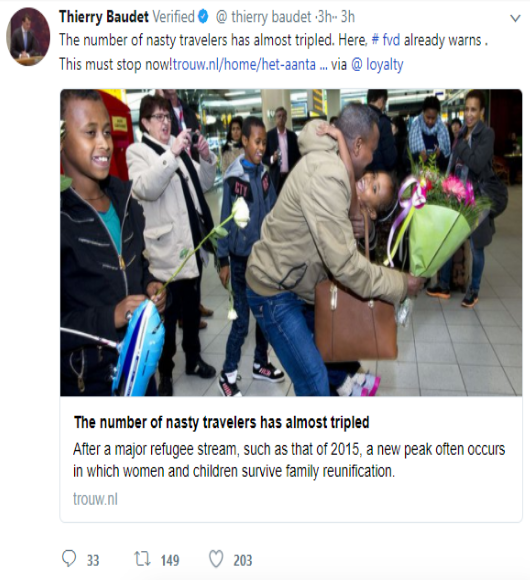
In the post above, Baudet expresses disgust as he mentions the fact that population numbers have nearly tripled since the influx of refugees, which started in 2015. Baudet also promotes his book, De Aanval op de Natiestaat often on his Twitter account, as can be seen in Figure 5. This sign of nationalism showcases that he feels threatened by the increasing number foreigners and is determined to keep the Dutch identity 'pure'.
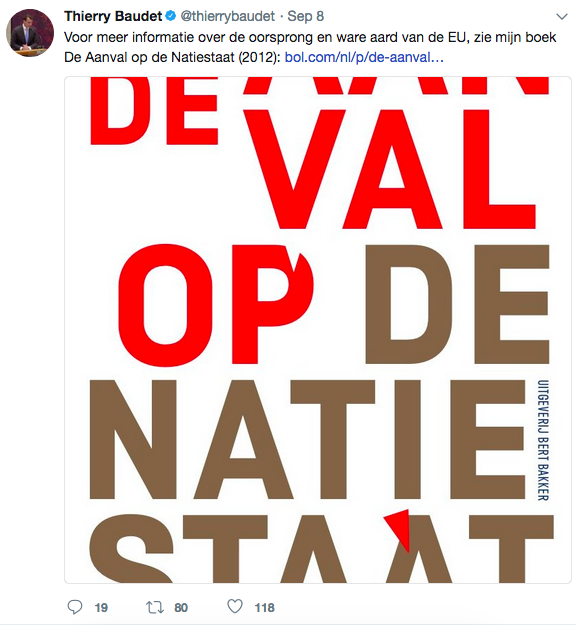
Threatened By Foreigners
In the book, Baudet states that ‘European unification and multiculturalism has weakened the nation state’. This remark is a clear indication on his beliefs regarding not only the refugee crisis and the impact it has had not only on the EU but also supranational institutions as one of the key features of supranational institutions include nominating various individuals to assist and embody the cumulative 'European' interest (Krase, 2017). In Figure 6, a niche audience is addressed, when Baudet indirectly states that he supports Muslim activist Shirin Musa who is fighting for equal rights amongst Muslim women. Through this message Baudet creates an image of himself as being inclusive and accepting of minorities. In other words, Baudet is positioning himself as someone who is pro-freedom and equality.
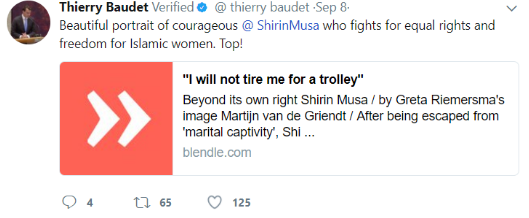
This is incredibly important to acknowledge, as minorities have been marginalized for years, but this has only recently become a topic that is addressed and highlighted in mainstream media, and much less so by right wing politicians. This comes across as Baudet addressing minorities, however, when looking at previous tweets and statements, one can deduce that Baudet is a clever and carefully curated political figure who utilizes social media as a tool to spread a positive message, or 'maverick' (Lempert and Silverstein) that is most likely constructed by FVD as a way to feed into the enlightenment ideology (Sternhell, 2010), where the audience are the ones who are enlightened as Baudet is speaking to those who believe that the Islamic faith is oppressive. The tweet does, however, differentiate him from another right wing Dutch politician and Partij voor de Vrijheid (PVV) leader, Geert Wilders, with whom he is often compared regarding their political beliefs about immigration. These comparisons leave room to believe that there are not many differences between the two (Akkermans, 2017). Wilders, however, is openly against Islam and that is where the difference is between him and Baudet. As can be seen in the tweet above, Baudet isn't as radical in his thinking on Islam as Geert Wilders is, but he still gives the Muslim population a poke, specifically because there could be implications on how some members of the Islamic community view women. The dissonance between that view and the Western perspective is problematic.
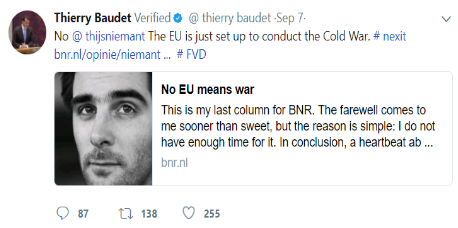
His target audience consists of those who are against Islam, against foreigners and pro-homosexuality.
In Figure 7, depicted above, Baudet is taking a nationalist stance against the EU, and it looks like he is reinforcing his main idea of NEXIT, a situation in which the Dutch would hypothetically withdraw from the EU. It is common for right wing populists to oppose the 2015 migrant crisis that brought thousands of citizens from mainly Muslim countries to Europe; this is a reason why many right-wing populists are against migrants and in favour of NEXIT. A sarcastic comment is made in Figure 8, shown below, which is used by Baudet to draw attention to the negative side of migration. Baudet can be seen attempting to advance his argument through this comment, which has been retweeted 382 times, favourited 451 times and has received 65 comments. It’s clear to see his use of sarcasm has made an incredible impact. Not only is he sharing a retweeted post, which shows he is against Islam’s views of peace in relation to homosexual individuals, but he is positioning himself once more and aiming for his target audience; those who are against Islam, against foreigners and pro-homosexuality.

2.2K Facebook Followers, But How Many Thumbs Up For Baudet?
Baudet is also active on Facebook, where his personal Facebook account is ‘exclusive’, as one has to send a friend request and cannot simply follow his page in order to stay updated with his posts. In the first public post below, he is organizing a giveaway of his own book as a way of promoting his Instagram account. Those who follow him on Instagram have a chance to win his book and feed into his ideas of anti-islam, anti-immigration and pro-purism.What is interesting to note is that the post only received 5 ‘likes’ while his page has 2.2k followers. This could be due to Facebook's algorithm as more popular figures and sponsored posts are usually shown first.
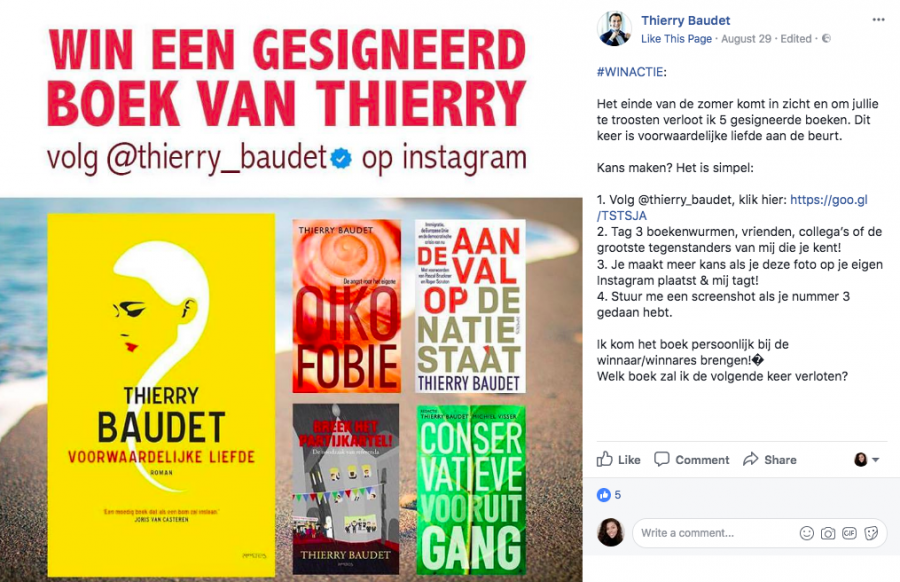
In the second public post, shown in Figure 10, he is questioning the funding of the documentary about Jesse Klaver, a candidate of the left wing party, GroenLinks. Naturally this adds fuel to the fire as it is no longer about Baudet calling Klaver out, but about the two well-known political parties and their supporters, who will inevitably get involved in the comment section to defend who they think is right. In addition to Baudet’s position on the ‘partijkartel’, he is suggesting that GroenLinks is corrupt. The post, which should have made more headlines as it’s about an active investigation and an accusation about corruption, received a mere 17 reactions, 16 of those in favour of what had been said. This is a classical political move that is usually intended to shed light on a situation or topic politicians find to be unsuitable and an example of how campaigns hope citizens will think twice about a politician's character before casting their vote in the next election round (Lempert and Silverstein).
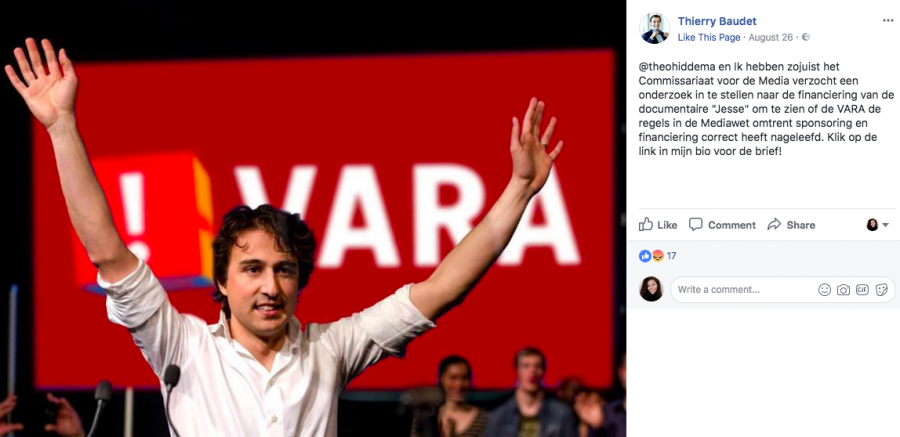
Baudet’s nationalistic attitude makes another appearance in Figure 11 below: a post aiming for virality as he is promoting not only his instagram account but also includes supporters of the FVD in a giveaway, where he gives his audience the chance to attend the semi-final of the Europees Kampioenschap (EK) women's soccer in Enschede.
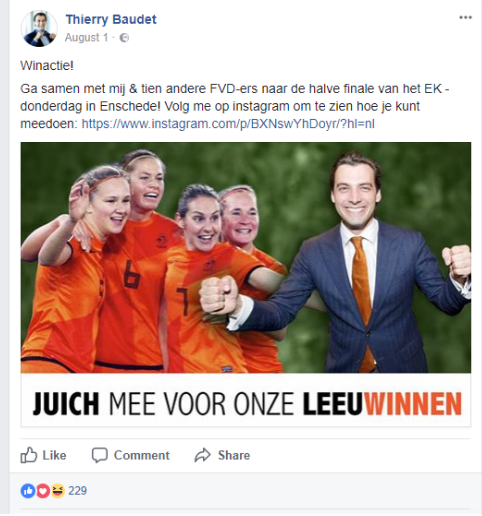
In the last picture, Figure 12, he is once again aiming to advertise his instagram account by posting a photo of himself in an Instagram cutout. The post was much more popular online as it received 105 reactions. Baudet is attracting attention, thanking his followers and encouraging citizens to celebrate with him, by following not only him but also FVD and a few other accounts. One user even commented "Thierry Baudet, you Insta-slut". This is a term that is used for those who want to gain likes, comments and followers quickly by means of self-promotion. All of these aforementioned tweets and messages, that Baudet is sharing with the public, act as building blocks in creating a puristic society, one in which the language, cultural norms, values and people are kept pure as purification implies little to no migrants or minority cultures that serve as a threat to Dutch culture.
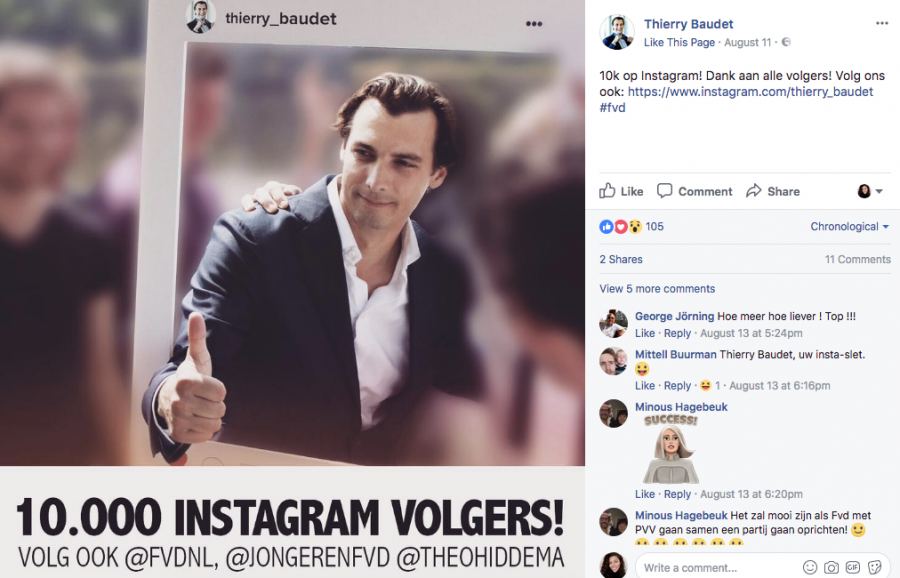
Keeping the Dutch identity pure
Forum Voor Democratie is a Dutch right wing political party that has a nationalist point of view. Thierry Baudet is its leader. The aims of this nationalist conservative party are clear: keep the Dutch identity pure, by protecting the Dutch culture in terms of reducing mass immigration, as can be seen in the numerous posts aimed towards immigrant groups, minorities and believers of Islam. These are all points which their targeted audience firmly stands behind, as seen in the Dutch general elections of 2017 when FVD first participated and managed to obtain two seats in the Dutch parliament. Following this victory, support for the party has rapidly increased, as can be seen in the statistics of both FVD’s public page and Thierry Baudet’s personal Instagram account, public Facebook posts and Twitter account.
Algorithmic populism indicates that while both accounts may have thousands of followers, neither receive many reactions and when they do, it is often in terms of giveaways or mudslinging and publicly calling out other politicians or political parties whose views FVD opposes, such as the example of Marcouch and GroenLinks. Every post by FVD has a ‘take-home’ message that is calculated, one which encourages the audience to question what lengths they are willing to go to protect their Dutch identity and how important their Dutch identity is to them.
References
Website Forum voor Democratie Retrieved October 22, 2017.
Facebook Forum voor Democratie (n.d.). Retrieved October 22, 2017.
I. M. (n.d.). De Nieuwe Recht
Forum voor Democratie -FVD. (n.d.). Retrieved October 21, 2017/
Recensie Thierry Baudet: veel gespin, weinig wol | DeJaap. Retrieved December 08, 2017/
NTR, O. (n.d.). Wat is Forum voor Democratie? | NPO Focus. Retrieved November 02, 2017/
Lempert, M. (n.d.). Lempert, Michael, and Michael Silverstein. Creatures of Politics: Media, Message, and the American Presidency. Retrieved November 02, 2017/.
Maly, I. (2018). Nieuw Rechts. Berchem: Epo.